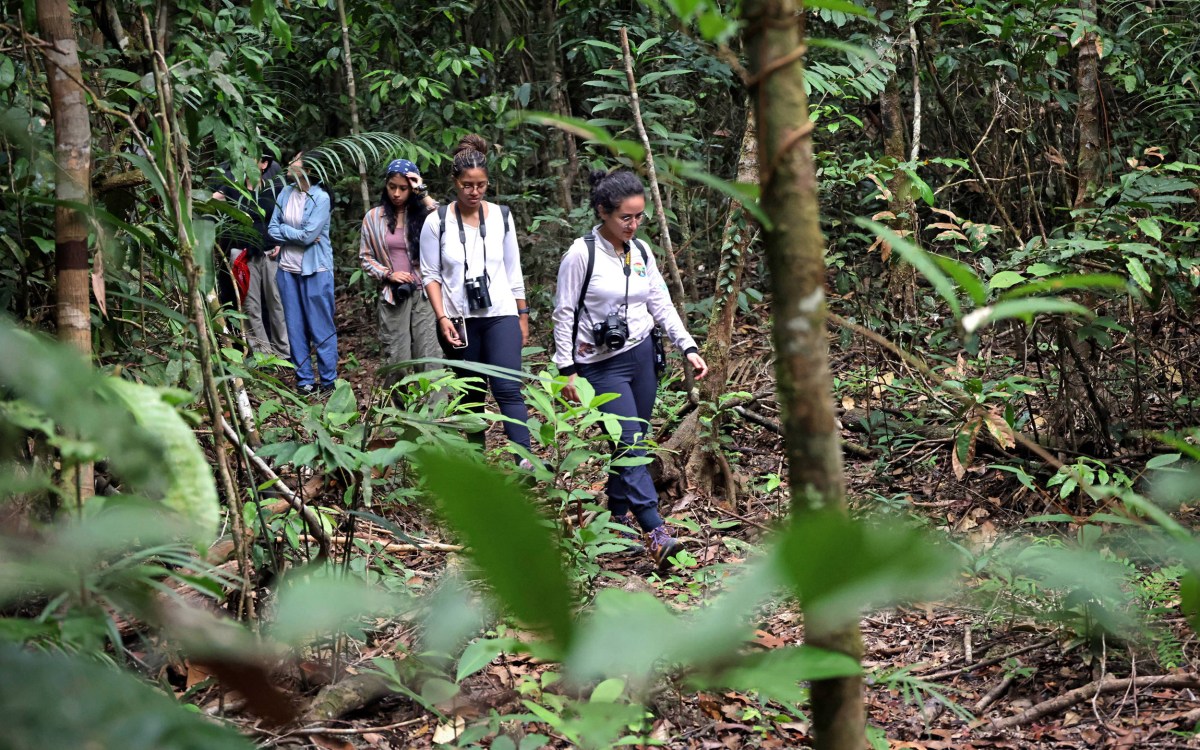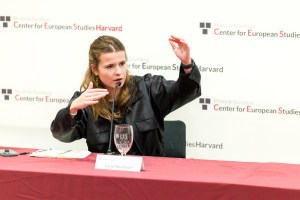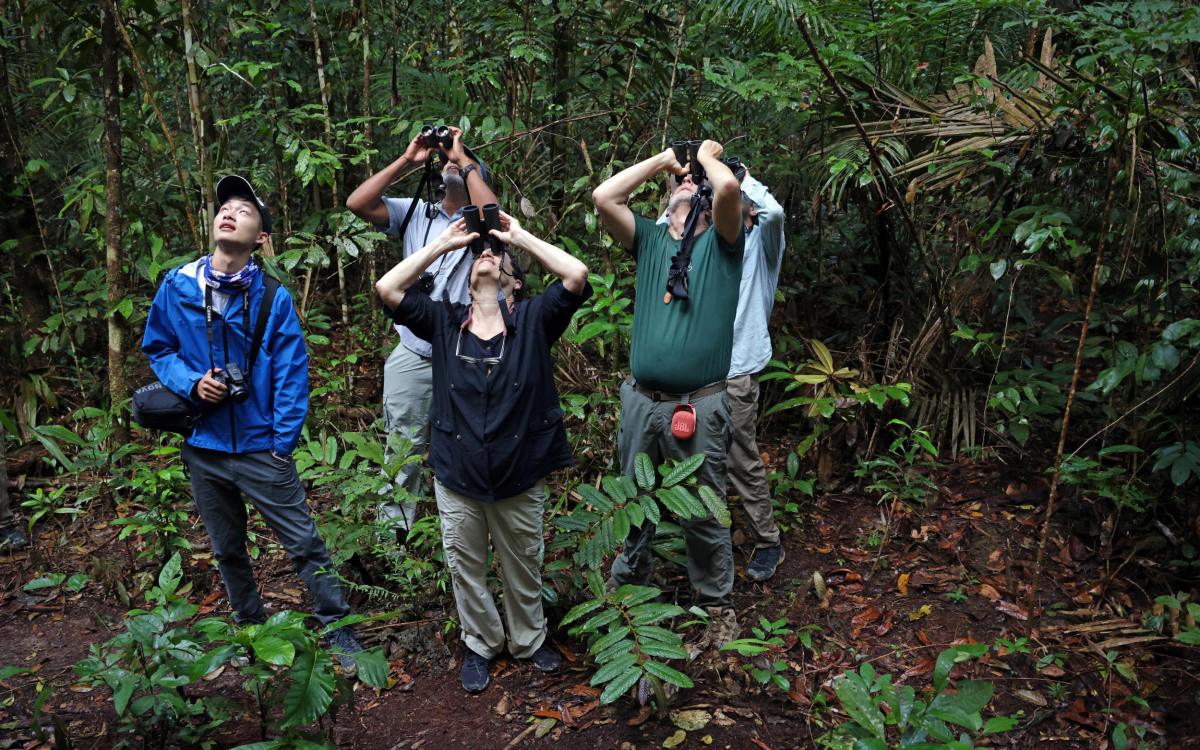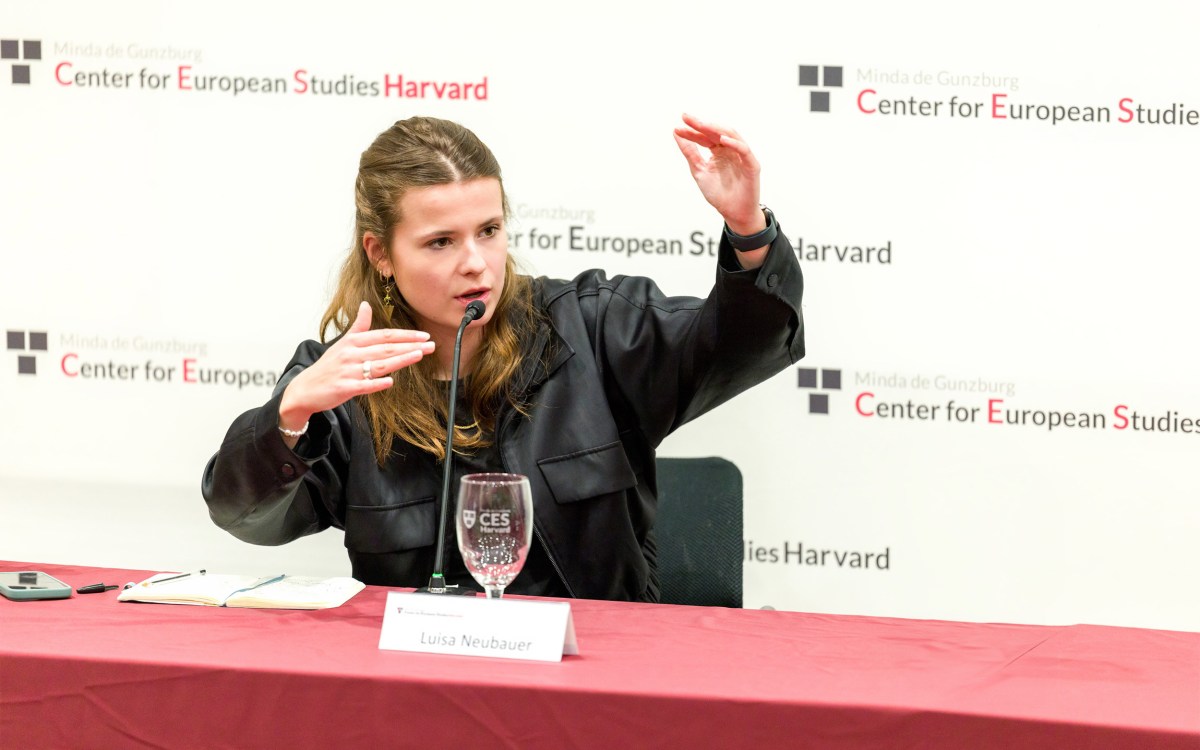Gore: Universities have important role in sustainability
Former vice president Al Gore ’69 addressed a crowd of 15,000 in chilly, leaf-strewn Tercentenary Theatre yesterday (Oct. 22), delivering the keynote address in a multi-day celebration of the University’s commitment to sustainability.
The Nobel Peace Prize laureate, who inspired the landmark 2006 film on global warming, “An Inconvenient Truth,” worried aloud about the present. He also praised the culture-shaking science of the past, and cast the future in a hopeful light – despite the atmosphere thickening with greenhouse gases, melting Arctic ice, and other signs of human-induced climate change.
Universities have a powerful role to play in this “existential crisis,” said Gore. They are originators and communicators of science and policy that are modeled on reason.
The technological and policy ideas – many of them from university settings – are already at hand to address global warming, he said. But the lessons and the urgency of the issue have not penetrated the corridors of power. Gore called the present a time marked by “a failure of nerve, a failure of moral leadership.”
The daring past offers lessons for the troubled present.
Gore noted that 2008 is the 400th anniversary of the invention of the telescope, the breakthrough in technology that a year later allowed Galileo Galilei to closely study the heavens. The Italian physicist and philosopher soon concluded that an old idea was false: Earth is at the center of the solar system.
“Knowledge has to be used to shift perspective,” said Gore. He offered Galileo’s discovery as one example. The Apollo space program was another, said Gore, since it gave humankind the first view of Earth as a fragile artifact in a vast universe. There was Roger Revelle, too, the Harvard oceanographer and climate change pioneer whose 1967 class changed the course of Gore’s life.
But transformative science is often met with opposition from leaders who want to turn “questions of fact” into “questions of power,” said Gore.
“Questions of fact should be questions to be explored,” he said. “They should not be waylaid on their way to the public forum.”
Questions of fact are the special province of academe, said Gore, who called for ways of making “better use of the knowledge created in universities.”
Harvard President Drew G. Faust, who introduced Gore as “the most effective living steward of the environment,” asserted that universities “have a special role and a special responsibility” in turning back climate change.
Such institutions, after all, prompt innovation, she said, and specialize in “the discovery and the dissemination of knowledge.”
Two decades ago, Faust noted, Harvard started the interdisciplinary collaboration that today is the Harvard Center for the Environment, a synergistic gathering of 150 faculty members from more than 20 disciplines.
And today, University experts are exploring ways to accelerate sustainable action, she said, including oceanic carbon sequestration, advanced fuel cell design, and renewable energy technologies.
Policy experts at the Faculty of Arts and Sciences and at the Harvard Kennedy School are at work on global warming too, said Faust, in part by putting together an “effective international approach” to greenhouse gas emissions for the Copenhagen Climate Conference in 2009. Others are studying a carbon tax, and other legal and economic strategies for protecting the environment.
In the teaching arena, she said, the new Graduate Consortium on Energy and Environment will create “a new generation of scholars” devoted to sustainability.
Overall, the goal at Harvard, Faust said, is to create “a community that lives the values implicit in its pursuit of knowledge.”
In his address, Gore went back again to 1608 and the telescope. The new tool inspired scientists to see Earth and the universe in a new way, but it also stirred up political opposition. “Galileo’s new knowledge,” he said, “turned out to be, forgive the phrase, ‘an inconvenient truth’.”
But the future – and calls to action – were at the heart of Gore’s speech, billed as this year’s Robert Coles “Call of Service” lecture, sponsored by Harvard’s Phillips Brooks House Association. “We need to put a price on carbon, we need a global [climate] treaty, and we need American leadership,” he said.
Gore urged the United States to be 100 percent free from carbon-based energy in a single decade — a commitment he acknowledged is so sweeping and dramatic that it would require a one-time “massive investment.”
But that giant step for mankind would also create an energy infrastructure “based on fuels that are free forever,” like solar, wind, and geothermal, said Gore. It would also break the back of an energy system that every year sends 700 billion American dollars overseas in pursuit of foreign oil.
Harvard has a role in a goal even so vast as that one, said Gore, who praised his alma mater for its pledge this summer to reduce Harvard’s greenhouse gas emissions 30 percent by 2016. “I’m proud to be part of the greater University family as an alumnus because of what you are doing here,” he said.
Since its founding in 1636 — shortly after the invention of the telescope, Gore noted — Harvard has been “from that time to this … a symbol of the devotion to reason so important to America.”
With the Founding Fathers, he said, “a new sovereign was installed in power” instead of kings — “the rule of reason.”
That rule of reason has lately been weakened in the public decision-making process, driven as it is by short-term horizons, said Gore. (He cited the miscalculation of invading Iraq and foot-dragging on climate change.)
Getting back to the rule of reason is necessary to make the “unprecedented decision” the world must soon make about its future to confront global warming, he said. “We are one people, living on one planet. We have a few short years to change the way we organize and conduct global civilization.”
Both Gore and Faust agreed that part of the answer is becoming better environmental citizens – taking the lessons of sustainability on a large scale to homes, offices, and schools.
Beginning with the challenge of campus greenhouse gas reductions, said Faust, “We at Harvard must be a model as we demonstrate our commitment to the future.”
At an institutional level, she said, “our practices have pedagogical value. We teach what we do, as well as what we write and say.”
And at an individual level, some signs of Harvard’s commitment to sustainability practices are already there, said Faust: 8,000-plus members of the University have signed a sustainability pledge, single-occupancy commuting is at a low of 18 percent, energy use in Harvard dormitories is down 13 percent since 2002, and 40 percent of produce served in Harvard houses, in season, comes from regional farms.
She called on the Harvard community to do even more, and viewed this month’s sustainability celebrations as an environmental call to arms.
Faust acknowledged that global warming is a global problem. “But climate change is also a local problem,” she said. “It begins with each of us.”
In the finale to his remarks, Gore said that the private and public solutions, big and small, are already at hand to address climate change — except for political will. “But political will,” he said, “is a renewable resource.”




